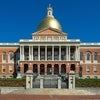Questions swirl around state budgets amid $311M shortfall
 Courtesy Photo
Gov. Charlie Baker said the state will manage the $311 million shortfall in tax revenues.
Courtesy Photo
Gov. Charlie Baker said the state will manage the $311 million shortfall in tax revenues.
As tax collections have faltered over the past two months, the Baker administration has confidently asserted that it can "manage through" what has become a $311 million shortfall in revenues with just weeks left until the end of the budget year.
But even as the details remain nebulous for what precisely that means for programs and employees across state government, bigger questions have started to be asked about the health of the Massachusetts economy and whether the downturn in revenue collections will linger into the next budget year, which begins in July.
Administration and Finance Secretary Kristen Lepore convened a private summit of Bay State economists and experts on Monday to examine the undercurrents that led to tax collections in April and May falling well below the Baker administration's expectations.
The meeting, confirmed by the administration, brought together Lepore and Revenue Commissioner Michael Heffernan with House Ways and Means Chairman Brian Dempsey, Senate Ways and Means Chairwoman Karen Spilka, Northeastern University economist Alan Clayton-Matthews and representatives from the Massachusetts Taxpayers Foundation, the Beacon Hill Institute and the Federal Reserve Bank of Boston.
The gathering was part of what the administration described in a recent financial disclosure statement as its plan to consult with the Department of Revenue and independent economists for "advice on whether these collections are the result of trends that will continue into fiscal 2017."
"It's only two months so we don't know whether this is an aberration or the beginning of a trend or economic softening. It's too early to tell. But of equal importance is the impact this could potentially have on fiscal 2017," said Eileen McAnneny, the president of the Massachusetts Taxpayers Foundation, who attended the meeting.
Gov. Charlie Baker, speaking to reporters later in the day, said withholding, sales and other categories of taxes that are "based on the velocity of the economy" remain "quite good," along with other economic indicators such as employment.
"We are blessed by a very robust economy here in the commonwealth. If you look at our unemployment rate, you look at the total number of people working, you look at our job participation rate we are probably a top five, top 10 states across any of those categories," the governor said.
The problem, according to Baker, stems from the flattening of the stock market in 2015 after a strong 2014 that resulted in many financial services firms reducing their estimates and seeking refunds in April and May after projected stock returns and income did not materialize.
After meeting in New York last week with the three top bond rating agencies, Baker said they called the phenomenon an "April surprise" that impacted other states as well.
"While $300 million is challenging, in relative terms it's a manageable number and, as I said, we started working on it months ago," Baker said.
May tax collections were up just 1.8 percent and fell $50 million below the monthly budget benchmark, the Baker administration reported late Friday. Income tax collections in May were $101 million below the monthly benchmark and withholding collections ran $53 million behind in May, according to the Department of Revenue.
Tax receipts over the first 11 months of fiscal 2016 are up 1.9 percent, well below the 4.8 percent project growth that was used to build the $38.4 billion budget for fiscal 2016.
"I think anytime you're looking at a potential budget deficit of $300 million or more, and I say that just based on where we stand with April and May revenues and less than 24 days in the year, it's challenging, there's no question about that," McAnneny said.
In a late May financial statement to bondholders, the administration cited "volatility in withholding taxes and a softer than anticipated spring tax filing season" as causes for what it now assumes will be below benchmark collections for the year.
As part of its plans to "actively manage the budget" through June, the Office of Administration and Finance said it had put restrictions on year-end spending, implemented payroll caps and began preparing for transfers to the general budget of unneeded trust fund balances.
The administration also said it would seek to accelerate departmental and federal revenue collections, and closely monitor year-end reversions of unspent funds from state agencies that could be put toward any deficit.
Budget officials did not provide any addition information requested on Monday about what trust funds were being eyed to balance the budget, or how overall state spending - another big variable in the budget - was trending 11 months into the fiscal year.
Depending on where the administration pulls that money from, any sweep of trust funds or accelerated federal reimbursements could help plug the fiscal 2016 hole, but open a new one in the still unfinalized fiscal 2017 budget.
Massachusetts Taxpayers Foundations officials said the largest trust funds that could be tapped come in the areas of transportation and health care, including funds meant to support health information technology and to incent alternative health care payment models.
With both the House and Senate having approved versions of fiscal 2017 budget, negotiators will sit down Friday to begin deliberating over a final spending document that they hope to get to Baker for his review before the end of the month.
Neither Dempsey nor Spilka's offices responded to requests for interviews on Monday, but House Speaker Robert DeLeo raised the possibility of the budget conference committee making adjustments to proposed spending in light of the tax collection performance.
"I think it's something that we have to watch and we have to watch closely. I think because of that I think as we go into budget negotiations I think it's incumbent upon us to take a look in terms of where we are in terms of spending and maybe there might be a possibility of adjusting in terms of what type of spending is going to be in the fiscal year '17 budget," DeLeo said, speaking to reporters after a meeting with Baker and Senate President Stanley Rosenberg.
Both the House and Senate produced budgets with about $39.5 billion in spending based on a projection of 4.3 percent growth in tax revenues.
"I think that the revenue numbers were optimistic, so one possibility is certainly to try to revisit that, but I don't know that they can rewrite the budget wholesale," said McAnneny, whose organization estimated a lower 3.8 percent rate of growth as lawmakers and the administration were developing a consensus projections for fiscal 2017. The taxpayers' foundation has not yet revised that estimate.
After April tax receipts declined, Baker's budget team ordered a halt to non-essential state spending and ruled out the use of rainy day reserve funds or layoffs as a means of pulling money into the state budget.









0 Comments